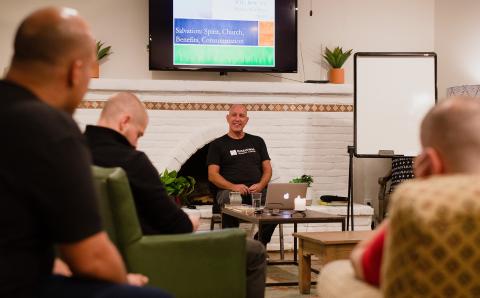I was often puzzled by the sudden turn in the crowd’s mood in Luke 4:16-30. Jesus was in his hometown, Nazareth, and read the scroll of Isaiah 61 in the synagogue. Verse 22 says, “All spoke well of him and were amazed at the gracious words that came from his lips.” But within a few minutes, the mood suddenly turned from praise to rage and an attempt to kill Jesus! What did Jesus say that incited them so?
Kenneth Bailey, a Bible scholar who spent 40 years steeped in Middle Eastern cultures much like Jesus’ ancient Jewish culture, helped me understand (Jesus Through Middle Eastern Eyes: Cultural Studies in the Gospels). The Greek translated as “spoke well of him” literally means “bore witness of him” and needs context to determine if the witness is positive or negative. Our English Bibles have mostly opted for “spoke well,” but Bailey argues it should be “spoke against.”
In other words, after Jesus read from the Isaiah 61 passage, they likely were already mad at him. Why? Because Jesus gave an edited and selective reading of Isaiah 61, sending a message they did not like. I’ll focus here on verse 19, “to proclaim the year of the Lord’s favor.” If we look at Isaiah 61:2, we notice that Jesus left out the rest of the sentence: “and the day of vengeance of our God.” By stopping mid-sentence, Jesus implied that his Messiahship was about grace and liberation, not vengeance.
Nazareth was in the province of Galilee and surrounded by Gentile territories, including Samaria, Syria, and Sidon. There was a strong “us (Jews) vs. them (Gentiles)” mentality among Galilean Jews. Jesus’ hometown likely interpreted Isaiah 61’s promises as “God will bless us Jews, free us from our Gentile oppressors, and bring judgment on our Gentile enemies, who will then serve us as we feed on their wealth” (see Isa. 61:5-6). The anticipated Messiah was supposed to bring this hope to fruition. That’s why the people of Nazareth were shocked by Jesus’ words of grace minus the judgment. They knew he was one of them, the same son of Joseph who grew up with them and was taught by their rabbis. I can imagine them grumbling, “Isn’t he one of us? Doesn’t he know our theology?”
Jesus knew they would want him to prove himself and his audacious message with miraculous works (v. 23). Jesus doubled down on his unpopular message by telling the stories of Elijah and the widow of Sidon and of Elisha and Naaman, the Syrian leper. The widow and Naaman were Gentiles, outsiders who, in the traditional reading of Isaiah 61, should have been among the “strangers” and “foreigners” who would serve them. Instead, Jesus implied that such outsiders and enemies might be beneficiaries of the Lord’s favor if they responded in obedient faith as the widow and Naaman did.
This is what drove the angry crowd over the edge into a murderous rage. How dare Jesus say that there might not be a day of vengeance on the Jews’ sinful enemies—but to say that God might actually bless those enemies instead of the Jews? That’s blasphemy!
Jesus casts a more inclusive vision of God’s kingdom, challenging his hometown’s cherished “us vs. them” beliefs. In response, they tried to “cancel” him. “No prophet is accepted in his hometown” (v. 24) because the people see any criticism from one of their own as betrayal.
About the Author
Shiao Chong is the former editor-in-chief of The Banner. He served as editor from 2016 to 2025. He attends Fellowship Christian Reformed Church in Toronto, Ont.
Shiao Chong es el redactor jefe de The Banner. El asiste a Iglesia Comunidad Cristiana Reformada en Toronto, Ont.
시아오 총은 더 배너 (The Banner)의 편집장이다. 온타리오 주 토론토의 펠로우쉽 CRC에 출석한다.
You can follow him @shiaochong (Twitter) and @3dchristianity (Facebook).









